Medication Constipation Risk Calculator
Find out which medications you're taking may be causing constipation and get targeted management recommendations. This tool identifies high-risk medications and suggests evidence-based solutions based on the specific drug mechanism.
Select Your Medications
Choose all medications you're currently taking that could cause constipation.
Your Constipation Risk Assessment
Many people don’t realize that the very medications they need for chronic pain, high blood pressure, or depression can cause one of the most uncomfortable side effects: constipation. It’s not just an annoyance-it can make you skip your pills, worsen your condition, or even land you in the ER. If you’re on opioids, anticholinergics, calcium channel blockers, or iron supplements, you’re at high risk. And the worst part? Most doctors don’t warn you about it until it’s already happening.
Why Your Medication Is Slowing You Down
Not all constipation is the same. When it’s caused by medication, it’s not about eating too little fiber or not drinking enough water-though those help. It’s about your drugs directly interfering with how your gut works. Opioids, for example, bind to receptors in your intestines and basically put your digestive system to sleep. Peristalsis-the wave-like muscle contractions that push food along-slows down by 30% or more. Fluid gets absorbed longer than it should, turning stools hard and dry. The anal sphincter tightens too, making it harder to push out even when you feel the urge. Anticholinergic drugs like diphenhydramine (Benadryl), some antidepressants, and antipsychotics like clozapine block acetylcholine, a key nerve signal that tells your gut to move. That’s why people on these meds often go days without a bowel movement. Calcium channel blockers like verapamil relax smooth muscle in the intestines, slowing transit time. Diuretics? They drain your body of fluids, leaving less water in your stool. Iron supplements? They irritate the gut lining and mess with your microbiome, which can cut bowel movements by a quarter. This isn’t random. It’s predictable. And that means it’s preventable.What Doesn’t Work (And Why)
If you’ve tried psyllium husk (Metamucil) or other bulk-forming laxatives and it made things worse, you’re not alone. These fiber supplements add volume to stool-but if your gut isn’t moving, all you get is bloating, gas, and more pressure. Studies show they can actually make medication-induced constipation worse in 10-15% of cases. Same goes for just drinking more water alone. Yes, hydration helps, but if your gut isn’t contracting, extra water won’t magically get things moving. And here’s the kicker: many people wait until they’re painfully backed up before doing anything. By then, it’s harder to fix. A Mayo Clinic survey found 60% of patients didn’t start any treatment until after constipation had already set in. That’s like waiting for a flat tire to happen before checking your spare.What Actually Works: The Right Laxatives for the Right Cause
The key is matching the treatment to the mechanism. One size does not fit all.- For opioids: Start with stimulant laxatives like sennosides (17-34 mg daily) and osmotic laxatives like polyethylene glycol (PEG 3350, 17g daily). These work together-PEG pulls water into the colon, sennosides trigger contractions. Together, they’re 60-70% effective. If that’s not enough, peripheral μ-opioid receptor antagonists (PAMORAs) like methylnaltrexone (Relistor) or naloxegol (Movantik) can reverse the gut-slowing effect without touching pain relief. They kick in within 4-6 hours.
- For anticholinergics: Switching meds is often the best move. If you’re on diphenhydramine for sleep or allergies, try loratadine (Claritin) or cetirizine (Zyrtec)-they cause constipation in only 2-3% of users versus 15-20% with Benadryl. For depression or Parkinson’s, your doctor might consider alternatives like SSRIs that don’t block acetylcholine.
- For calcium channel blockers: Verapamil is more likely to cause constipation than amlodipine. If you’re on verapamil and struggling, ask if switching to amlodipine is possible. It’s less likely to cause GI issues.
- For iron supplements: Try switching to ferrous fumarate or liquid iron, which are gentler. Take them with vitamin C to improve absorption and reduce gut irritation. Pair with a low-dose stimulant laxative if needed.
Prophylaxis Is the Secret Weapon
The best time to treat medication-induced constipation? Before it starts. BC Cancer guidelines and the National Institutes of Health both recommend starting a laxative the same day you begin opioids. Don’t wait for symptoms. Prophylaxis cuts the risk of severe constipation by half. Sennosides and PEG are the most commonly used combo for this. A cancer patient on long-term morphine who takes 17mg sennosides and 17g PEG daily often reports zero constipation-while still getting full pain control. This isn’t just for cancer patients. Anyone on chronic opioids, anticholinergics, or calcium channel blockers should consider it. Yet only 35-40% of primary care providers do this routinely, according to JAMA Internal Medicine. That’s a gap you can’t afford to ignore.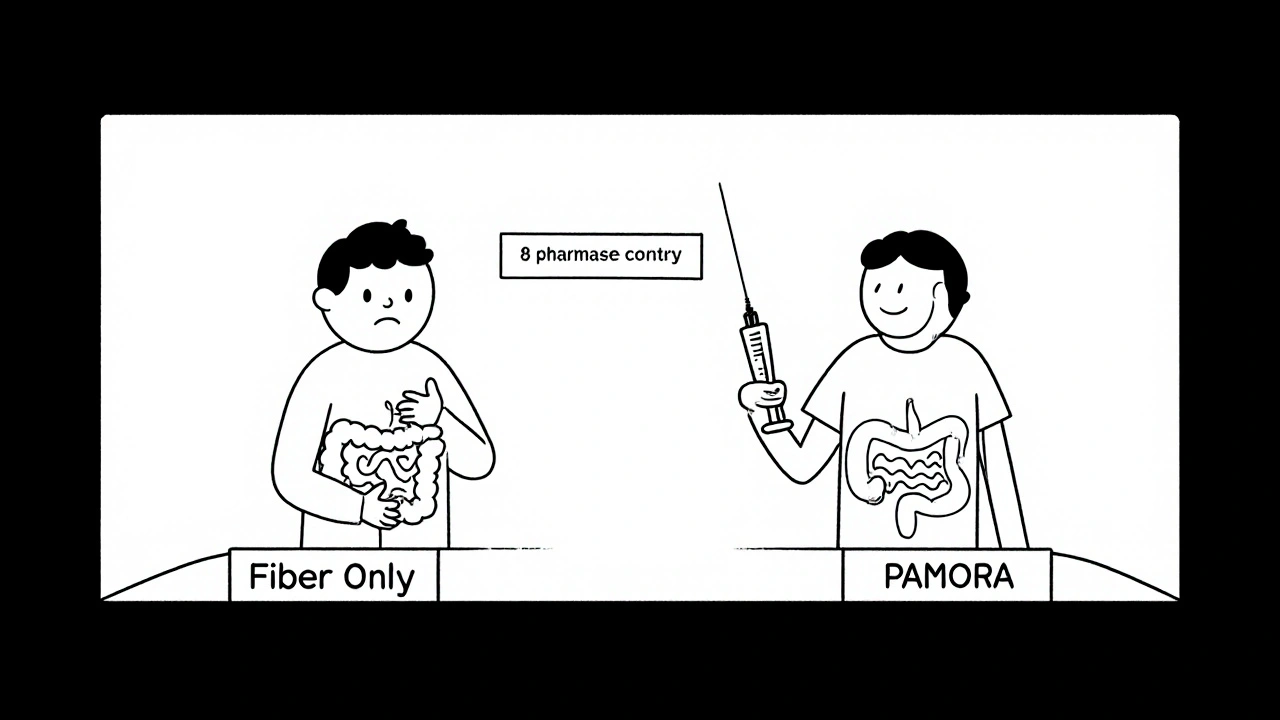
When to Ask for Something Stronger
If you’ve tried sennosides and PEG for a week and still haven’t had a bowel movement, or you’re bloated, nauseous, or in pain, it’s time to talk about PAMORAs. These are prescription-only drugs that block opioid receptors in the gut but not in the brain. So your pain relief stays intact. Methylnaltrexone (Relistor) is given as a subcutaneous injection and works in under 4 hours. Naloxegol (Movantik) and naldemedine (Symproic) are pills taken daily. Clinical trials show 65-75% of patients have at least three spontaneous bowel movements per week after starting them. That’s life-changing for someone who’s been stuck for months. The downside? Cost. Relistor can run over $1,200 a month without insurance. Some patients wait three months or longer to get it approved. That’s why many end up suffering unnecessarily. If your doctor says it’s too expensive, ask about patient assistance programs-most manufacturers offer them.Diet and Lifestyle: Helpful, But Not Enough
Yes, eat your veggies. Drink your water. Move your body. But don’t mistake these for a cure. Fiber and fluids help maybe 20-30% of the time with medication-induced constipation. Alone, they won’t fix the root problem. But when combined with the right laxatives? They boost results. Aim for 25-30 grams of fiber daily from fruits, oats, beans, and chia seeds. Drink 2-3 liters of water. Walk 20 minutes after meals. These habits support your treatment-they don’t replace it. And avoid overdoing it with fiber if you’re on opioids. Too much can cause impaction. Start low and go slow.Red Flags: When Constipation Is Dangerous
Constipation is usually just uncomfortable. But sometimes, it’s serious. Call your doctor if you have:- No bowel movement for more than 5 days while on medication
- Severe abdominal pain or swelling
- Vomiting, especially if it’s green or smells foul
- Rectal bleeding or black, tarry stools
- Fever or dizziness along with constipation
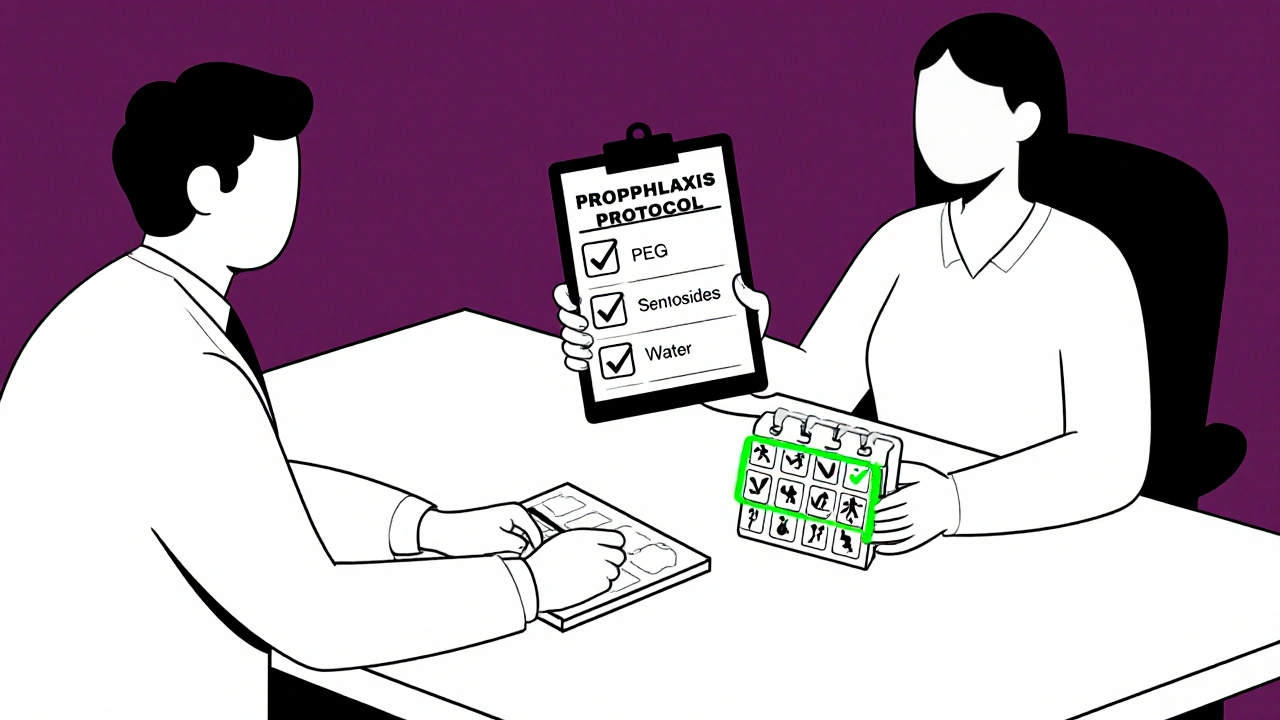
What Patients Are Saying
On Reddit’s r/ChronicPain, 78% of users said they stopped taking opioids because of constipation-until they tried Relistor. One wrote: “Six months of misery. Then one shot. I had a bowel movement the next day. I cried.” On Drugs.com, Relistor has a 4.2/5 rating from nearly 400 reviews. The top comment: “Finally, I can eat without worrying. I can sleep without pain. I’m not a prisoner to my gut anymore.” But many still struggle. A CancerCare survey found 40% of clozapine users say their daily laxatives don’t help enough. Others say their doctor dismissed their symptoms as “just part of aging.” That’s unacceptable.What’s Next: Better Tools Coming
The future of managing medication-induced constipation is personalization. Mayo Clinic’s electronic health system now flags patients on high-risk meds and auto-suggests prophylactic laxatives. That’s cut MIC cases by 30%. Researchers are also testing microbiome-targeted therapies. Seres Therapeutics’ SER-287, currently in Phase 2 trials, is designed to restore healthy gut bacteria disrupted by drugs. Early results show 40-50% improvement in symptoms. And drug companies are racing to make PAMORAs cheaper and more accessible. Expect more generic versions by 2027.Bottom Line: You Don’t Have to Suffer
Constipation from medication isn’t normal. It’s not something you have to live with. You’re not being dramatic. You’re not weak. Your body is reacting to a known side effect-and there are proven, effective ways to fix it. Start by identifying which of your meds are likely culprits: opioids, anticholinergics, calcium channel blockers, iron, or diuretics. Talk to your doctor about starting a laxative the same day you begin the medication. Don’t wait. Use stimulants and osmotics first. If they don’t work, ask about PAMORAs. And don’t let cost stop you-ask about financial aid. Your health is too important to let constipation steal your quality of life. You’re on medication to feel better. You shouldn’t have to pay for it with daily misery.Can I just take more fiber if I’m constipated from pills?
No-not if you’re on opioids or anticholinergics. Bulk-forming fiber like psyllium can make constipation worse by adding volume without helping your gut move. Studies show it increases bloating and discomfort in 20-30% of medication-induced cases. Stick to osmotic laxatives (like PEG) and stimulants (like sennosides) instead.
How long does it take for laxatives to work with medication constipation?
Osmotic laxatives like PEG usually take 1-3 days. Stimulant laxatives like sennosides work in 6-12 hours. But if you’re on opioids, PAMORAs like Relistor can work in as little as 4 hours. Waiting more than 3 days without a bowel movement means you need to switch strategies.
Are over-the-counter laxatives safe for long-term use?
Stimulant laxatives like sennosides are generally safe for long-term use under medical supervision. Osmotic laxatives like PEG are also safe for months or years. But avoid stimulants like senna if you have kidney disease or electrolyte imbalances. Always check with your doctor before using any laxative daily for more than 2 weeks.
Can I stop my medication if constipation is too bad?
Never stop a prescribed medication without talking to your doctor. Stopping opioids suddenly can cause withdrawal. Stopping blood pressure meds can raise your risk of stroke or heart attack. Instead, ask about switching drugs or adding a targeted laxative. There’s almost always a solution that lets you keep your treatment.
Why don’t doctors always warn patients about this?
Studies show 65-75% of patients starting opioids get no constipation advice. Many doctors assume patients will mention it, or they think it’s a minor issue. But it’s one of the top reasons people quit life-saving meds. The problem is systemic-not individual. You have to be your own advocate. Ask: “Will this cause constipation? What should I do to prevent it?”
Is there a test to confirm my constipation is from meds?
No single test confirms it, but your doctor can rule out other causes with a medical history, physical exam, and sometimes blood tests to check for electrolyte imbalances or thyroid issues. If your constipation started after beginning a new drug and improves when you change the drug or add a targeted laxative, that’s strong evidence it’s medication-related.
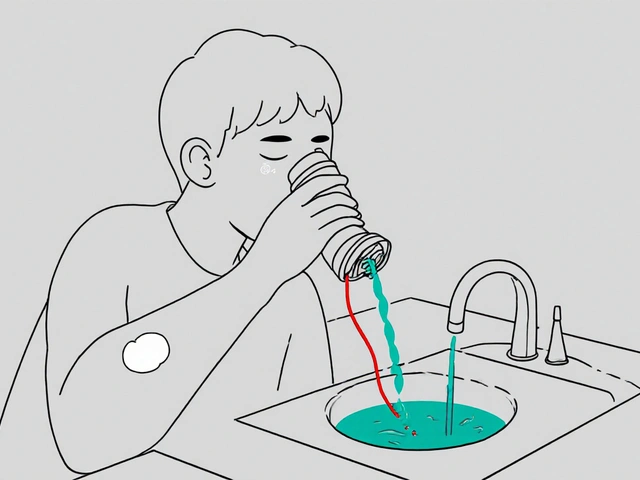
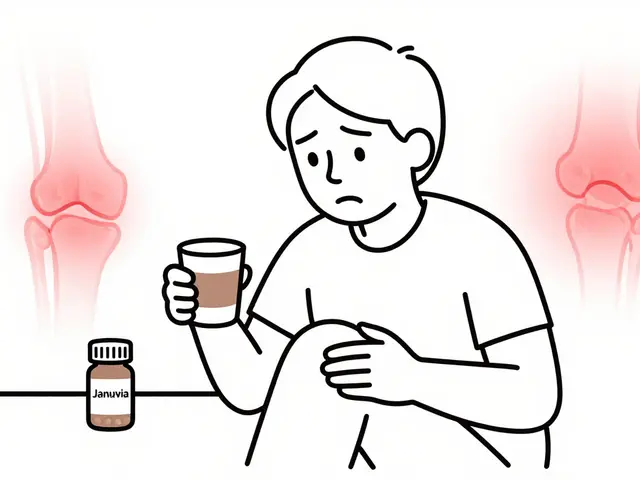

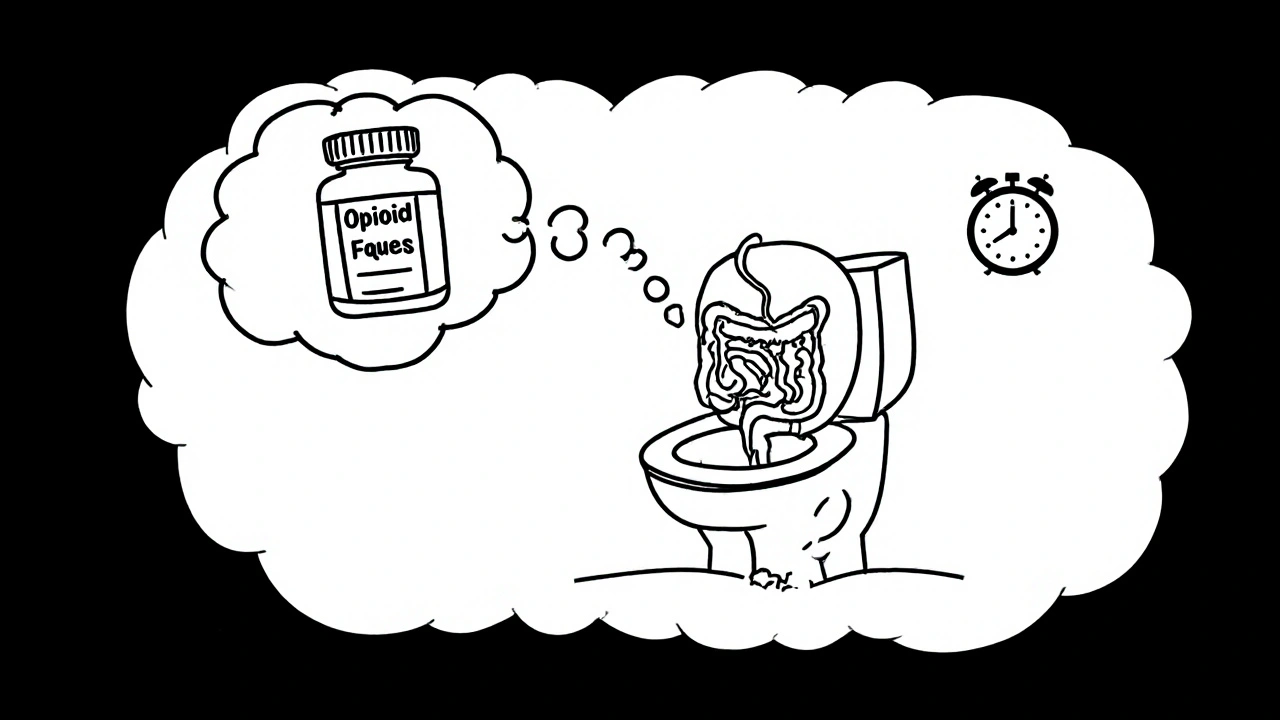
Comments
14 Comments
Asha Jijen
So basically your doctor gives you a pill that turns your gut to concrete and expects you to just deal with it
Lauren Zableckis
I’ve been on verapamil for three years and never knew it could do this. I thought I was just getting older. This post changed everything.
Kaleigh Scroger
For anyone on long-term opioids or anticholinergics, start PEG and sennosides Day 1. No waiting. No hoping it gets better. I’ve seen patients go from 5 days between BMs to daily within a week just by following this protocol. It’s not magic, it’s physiology. Your gut isn’t broken, it’s just frozen. The laxatives aren’t crutches-they’re the key to unlocking it. And yes, fiber alone will make it worse if you’re on opioids. I’ve had patients end up in ER with impaction because they were told to "just eat more broccoli." Broccoli doesn’t fix a nervous system that’s been chemically sedated. You need osmotic + stimulant. Period. And if your doc says "try Miralax first" and you’ve been constipated for two weeks, walk out and find someone who knows what they’re doing. This isn’t optional. It’s medical necessity.
marie HUREL
I didn’t realize how much I was suffering until I started taking PEG daily. I thought the bloating and pain were just "part of being on pain meds." Turns out I was just untreated. Now I eat without fear, sleep without discomfort, and actually feel like myself again. Why isn’t this standard practice everywhere?
Gayle Jenkins
Stop waiting until you’re in agony. Start the laxatives the same day you start the medication. That’s not advice-that’s a survival tactic. I’ve coached dozens of patients through this. The ones who wait? They end up in the ER. The ones who act early? They live their lives. You’re not being dramatic. You’re being smart.
reshmi mahi
Indian doctors don’t even know what constipation is. They just say "eat papaya" and charge you 500 rupees for a consultation. Meanwhile, Americans are getting injections for this. We’re still stuck with senna powder and shame.
laura lauraa
It’s fascinating how society has normalized suffering. We accept constipation as a "minor side effect," as if the body’s fundamental processes are negotiable. The medical industrial complex profits from your silence. You’re not broken. The system is. And yet, here we are-talking about PEG and sennosides like they’re Band-Aids on a ruptured artery. The real tragedy? It’s preventable. And yet, it persists. Because convenience trumps compassion. And that’s not just medical negligence-it’s moral failure.
Elizabeth Choi
Anyone else notice how this post is basically an ad for PAMORAs? Relistor costs over a grand a month. Most people can’t afford it. The author sounds like they work for the pharmaceutical company. Prophylaxis is good, but the real solution is making these drugs cheaper. Or better yet-stop prescribing opioids like candy.
Allison Turner
Ugh. Another post telling people to take laxatives. I’ve been on iron for years. I take stool softeners. I drink water. I walk. Still constipated. So now I’m supposed to take two more pills? This is just adding more pills to the pile. What about just not taking the iron? Maybe the real problem is that we’re overmedicating everything.
Darrel Smith
Let me tell you something, folks. This isn’t about laxatives. This is about the decline of personal responsibility. Back in my day, people didn’t run to the doctor every time they felt a little sluggish. They ate their greens, they drank their water, they walked. Now? We want a pill to fix the pill we took. And now we want another pill to fix the first pill’s side effect. We’re not healing-we’re just layering on more chemicals. You want to fix constipation? Stop taking the opioid. Or at least, stop being so weak. Your body is telling you something. Listen to it. Not your prescription pad.
Aishwarya Sivaraj
I’ve been on clozapine for 8 years and my bowel movements are still a nightmare. I take sennosides daily but it’s never enough. I wish someone had told me earlier that switching to liquid iron helped. I switched last year and my bloating dropped by half. Also, try magnesium citrate at night-it’s gentle. I’m not a doctor but I’ve lived this. You’re not alone. And yes, your doctor might not know this stuff. That’s why we have Reddit. Keep asking. Keep pushing. You deserve to feel normal.
steve stofelano, jr.
It is imperative to underscore that prophylactic intervention constitutes a paradigmatic shift in clinical practice, particularly with regard to pharmacologically induced gastrointestinal hypomotility. The evidence base, as presented, is both robust and compelling, and the integration of osmotic and stimulant laxatives as a standardized protocol represents a significant advancement in patient-centered care. It is regrettable, however, that such protocols are not yet universally implemented across primary care settings, despite their demonstrated efficacy and cost-effectiveness in reducing emergency department utilization. I respectfully urge healthcare institutions to adopt formal guidelines to ensure equitable access to these interventions.
Savakrit Singh
USA has everything 🤦♂️. In India, we just take aloe vera juice and pray. But hey, at least we don’t pay $1200 for a shot. 🤡😂
Edward Batchelder
This is the kind of post that reminds me why I love this community. Someone took the time to explain the science, the solutions, and the real-life impact-and they didn’t just dump information, they gave people a roadmap. Thank you. If you’re reading this and you’re on one of these meds? Don’t wait. Talk to your doctor. Ask for PEG and sennosides. Ask about PAMORAs. You’re not being a burden. You’re being smart. And you deserve to live without daily misery. You’ve got this.
Write a comment